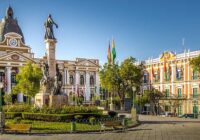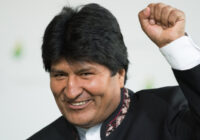Just as right-wing incumbents in Chile, Ecuador and Argentina are experiencing a substantial pushback following the implementation of neoliberal economic reforms, left-wing and populist leaders in Latin America are also feeling the heat of popular discontent. In Bolivia, people have taken to the streets following an election held on October 20, to rally both for and against the “reelection” of Evo Morales to his fourth term as president.
Elected Bolivia’s first indigenous president in 2006, Morales is, alongside Venezuela’s Nicolas Maduro and Nicaragua’s Daniel Ortega, one of the last remnants of the so-called “pink tide” that catapulted leftist leaders to power all over Latin America during the early 2000s. President Morales’ first election was historic, both for Bolivia and for the region, as were his first few years as head of state, which brought attention to indigenous peoples’ rights as well as progress in the fight against income and social inequality. However, Morales’ quasi-cult of personality and his close ties to Caracas have eroded Bolivia’s democracy over the long term.
Pushing Constitutional Boundaries
One of the fundamental presuppositions of democracy is that all citizens, regardless of social status or education, will choose to support those candidates who make their lives socioeconomically better. However, in Latin America, political tribalism, the proliferation of social media echo-chambers and other ideological factors have led voters to support political leaders even at their own detriment.
In his three terms in office, Morales already undermined Bolivia’s Constitution, which states that presidents cannot serve more than two consecutive terms, by getting the country’s high court to agree that the limitation did not apply to his first term because he had been elected in 2006 — three years before the new constitution was approved. In 2016, having lost a referendum to approve a constitutional amendment that would have allowed him to run for reelection indefinitely, Evo Morales went to the country’s highest court, and a majority of judges — appointed by him — ruled it constitutional for him to run for a fourth term.
With the October 20 election already questionable in terms of legitimacy, Morales was well aware that a he couldn’t afford to go into a second round in which the opposition would rally around one candidate. Therefore, it became imperative for Morales to win during the first electoral round either by securing at least 50% of the vote — which is extremely challenging given the president’s shrinking base and declining approval — or by securing more than 10 percentage points over his closest contender in order to be declared president without automatically triggering a runoff.
This second scenario, though still challenging, seemed the most applicable to President Morales’ political machine that has a solid base among about a third of the country’s voters. Nevertheless, as the results started coming in and it became apparent that the opposition candidate and former president, Carlos Mesa, was coming neck-in-neck with President Morales at around the 40% mark, the government and the electoral authorities seemed to have taken matters into their own hands. Taking a 24-hour break in the counting of the votes, officials then declared a 47.08% win for Morales — the coveted 10-point advantage that secured a Morales victory.
Heat of the Street
The apparent corruption of the Morales administration has led to mass protests organized by the opposition and others social movements, which the president dismissed as a “coup d’état.” Demands for a second round are growing amid fraud allegations and the resignation of the vice president of the electoral council, Antonio Costas — a story all too familiar in the region. The protests, which began the day after the election, have spread all across the country throughout major cities, including Santa Cruz, La Paz, Sucre and Cochabamba. Many of the recent protests across Bolivia are yet another rejection of Morales’ reluctance to accept the results of the 2016 referendum, when 51.3% of the voters said no to a possibility of him running for another term. The support that once secured the Morales presidencies is now crumbling.
Attempting to counter popular discontent, Morales’ Movement for Socialism (MAS) party has organized rallies in support of the president that, on occasion, have led to violent clashes with opposition protesters. Meanwhile, regional allies like President Maduro have denounced the opposition for attempting to follow the Venezuelan script. Nonetheless, in addition to Morales’ narrow victory, his political party has secured a majority in both houses of Bolivia’s legislative branch.
Bolivia’s opposition parties are demanding the annulment of the electoral results and calling for a new ballot. Likewise, the Organization of American States and the European Union are publicly calling for a runoff round and election audits. But President Morales remains unmoved. Regardless of his achievements in infrastructure development and social advancement, as well as his solid popular base, Evo Morales is currently traversing one of his most challenging times as he finds himself isolated in the region and with a country that is both divided and polarized.
As protests persist throughout Bolivia, both sides remain committed to sticking through the standoff. Morales enjoys strong backing in the rural areas and has summoned his supporters to descend upon urban centers. Meanwhile, opposition leader Carlos Mesa faces the uphill challenge of rallying the international community to a point that it pressures Morales to backtrack and replay the election. However, in this case, time and the status quo favor President Morales.
While Chilean President Sebastian Pinera and Ecuadorian President Lenin Moreno are blaming Caracas’ and Havana’s proxies for their domestic troubles, Bolivia’s government and its allies in the region are blaming the “dark forces of capitalist imperialism” for the protests contending the legitimacy of Morales’ reelection. Nevertheless, regardless of political ideology, Evo Morales, the longest serving head of state in Latin America, is doing a great disservice to both his legacy as the first indigenous president and to his country’s democracy by insisting on continuing with a presidency that would last at least two decades — at the expense of Bolivia’s democratic institutions.
The views expressed in this article are the author’s own and do not necessarily reflect Fair Observer’s editorial policy.
Support Fair Observer
We rely on your support for our independence, diversity and quality.
For more than 10 years, Fair Observer has been free, fair and independent. No billionaire owns us, no advertisers control us. We are a reader-supported nonprofit. Unlike many other publications, we keep our content free for readers regardless of where they live or whether they can afford to pay. We have no paywalls and no ads.
In the post-truth era of fake news, echo chambers and filter bubbles, we publish a plurality of perspectives from around the world. Anyone can publish with us, but everyone goes through a rigorous editorial process. So, you get fact-checked, well-reasoned content instead of noise.
We publish 2,500+ voices from 90+ countries. We also conduct education and training programs
on subjects ranging from digital media and journalism to writing and critical thinking. This
doesn’t come cheap. Servers, editors, trainers and web developers cost
money.
Please consider supporting us on a regular basis as a recurring donor or a
sustaining member.
Will you support FO’s journalism?
We rely on your support for our independence, diversity and quality.





